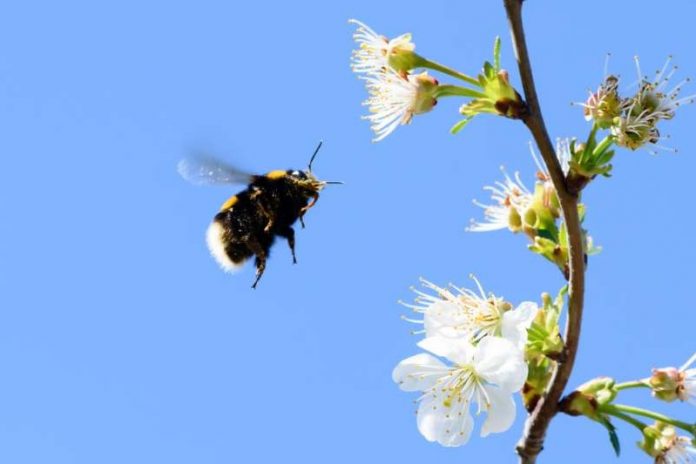
Bumble bees and other pollinators suffer disrupted sleep patterns if they come into contact with a controversial class of pesticides – an effect which may be a factor in their widespread decline, according to new research by British scientists.
Exposure to neonicotinoid insecticides at a level similar to that likely to be found on a farm left bumble bees and fruit flies sleep deprived and their natural daily cycles of activity out of sync, meaning the “drugged” pollinators were less active during the day when they would normally be visiting plants.
Damage to ability to learn food locations
The two studies by University of Bristol experts found that insects exposed to neonicotinoids not only slept less but also suffered damage to their ability to remember and learn where their food is in the surrounding environment.
All four major types of neonicotinoid insecticides were banned by the EU in 2018 and the UK has pledged to maintain that ban post-Brexit. But the Government this month joined several European countries by announcing it has granted emergency permission to UK sugar beet producers to use seed treated with a noenicitinoid pesticide to counter a virus badly affecting the crop.
Officials pointed out that sugar beet is non-flowering and therefore presents minimal risk to pollinators but conservation groups were sharply critical, arguing thatthe pesticide could damage the eco-system and find its way into water courses. Beyond the EU, neonicotinoids remain the world’s most commonly-used insecticides.
Wakefulness
The Bristol researchers said that the neonicotinoids appeared to affect the part of the nervous system of bumble bees associated with so-called circadian rhythms controlling wakefulness and activity levels. This internal clock allows insects to adjust their sleep times and coincide their activity with the times of day when they can collect the most food.
The study focusing on bumble bees found that those exposed to the insecticides showed an increase in daytime sleeping and activity at night, meaning fewer foraging opportunities and a probable knock-on effect for colonies to grow and reproduce.
Dr James Hodge, associate professor in neuroscience and a senior author for one of the studies, said: “Being able to tell the time is important for knowing when to be awake and forage, and it looked like these drugged insects were unable to sleep. We know quality sleep is important for insects, just as it is for humans, for their health and forming lasting memories.”
Vanishing from the wild
The researchers, whose studies into bumble bees and fruit flies are published in the journals iScience and Scientific Reports respectively, said their findings could provide insights into why insect pollinators are vanishing from the wild.
Of the five most important crop pollinators in Europe, three are bumble bees – and yet nearly half of species of the insect in Europe are in decline, with 24 per cent threatened with extinction.
Dr Kiah Tasman, lead author of the studies, said the decision to grant permission for emergency use of neonicotinoids for British sugar beet production was “very concerning” and gave grounds for concern that Britain may eventually lift its ban.
She said: “I understand the concerns of farmers but these pesticides have proven very harmful to pollinators and the effect of loss of pollinators on crop yields and biodiversity would be crippling. We need more investment in alternatives.”




























